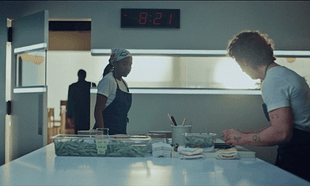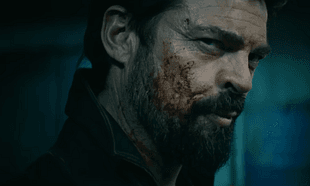SPOILER ALERT: If you haven't watched Felina, bookmark this here review and come back later for a bit of post Breaking Bad banter.
These final eight episodes, more so than any others in the history of Breaking Bad, have scrutinised the chasm between Walter and Heisenberg. We've long known that Walt is panicky, at times comical and incredibly lucky, where Heisenberg is painted as some infallible demi-god of meth-production lore, but the differences were laid bare this year before the two were reconciled in this post-'Ozymandias' epilogue.
The Walt of 'Felina' puts on the Heisenberg hat one last time, but his actions could be construed as selfless - to a significant degree. Now, let's not forget that this is a man on his last legs. Death, by the hand of cancer, Nazi or APD, is coming, but the leaps he takes now are for his family and inner peace rather than self-preservation. Albuquerque is his deathbed, and he needs to right some wrongs, before the lights go out.
There's a misconception in some parts that the cancer transformed Walt into a monster, when really the seeds had been sown long ago with his unceremonious departure from Gray Matter, so it is only fitting that his last ride begin at the home of Elliot and Gretchen Schwartz. These two cosy intellectuals are easily fooled by the façade of Heisenberg, even if hardened criminals and Walter's family would never fall for it these days.
His plan to get his money to Junior via his former friend is genius, but the scare he puts into them with "the two best hitmen west of the Mississippi" - the fearsome Badger and Skinny Pete - is just as important. Getting one-up on his his ex-business partner and -girlfriend is what he has been craving since long before a spot showed up on his lung.
Even now, though, he calls them "beautiful people" and calls on them to "make it right". He stills imagine himself as a vengeful Robin Hood figure, even if Gretchen only wronged him slightly and his downfall was largely a self-construct. It is still a moment tinged with sadness, however. Amid the theatricality and comedy ("Elliot, if we're going to go that way, you're going to need a bigger knife"), he takes the time to look around their state-of-the-art home and all the happy memories they've collected.
Separated by a pillar, they are unaware as he looks over their lives. Contrast that with Skyler, who is left to chain-smoke and drink in what looks like a cramped replica of the White family home. Again, Walt is shielded by a pillar as Skyler takes Marie's phone call. The abject differences between what is and what might have been are there for all to see, and Walt is no longer in denial about his mistakes, nor his motivations, at least. "I did it for me. I liked it; I was good at it, and I was really... I was alive."
And there it is: self-awareness, truth. Finally admitting to what was so obvious to so many people for so long, and with such ease. Maybe the understated tone he uses comes with the knowledge that this is all too little, too late. Marie is a widow; Skyler, consigned to a beige life, soon will be, and all this earns him is one last chance to stroke his daughter's hair.
For better or worse, Walt dominates the episode as the remaining major characters are given brief cameos on his death march. That's fair enough - it's his show after all - but the fact that Skyler is limited to that one scene is somewhat frustrating. What's more is that she looks on, perhaps lovingly, at Walt as he says his goodbyes - his admittance has seemingly quelled any pain wrought from the his destruction of her life. Jesse as well is only present for two scenes: the first a somewhat laughable dream sequence that brings up his lost love of carpentry and a fine wooden box he traded for some weed way back when. Watching as Jesse crafts a new box, bathed in golden light as church organs filter in, is among the more surreal moments in these later seasons, even if it quickly cuts back to real life soon enough.
His other scene is, of course, the climactic confrontation in Jack's club house, which plays out perfectly, in line with Walt's fantasies. Things don't usually go to plan for Walt, but season five has seen things truncated. Mike's death, the simultaneous prison stabbings and Walt confessing everything on the phone to Jesse either would have felt less rushed or just wouldn't have happened in earlier seasons, but time was of the essence.
Walt's key-activated machine gun is another fine plan of his in an episode full of them, and, again, everything works like clockwork. It's funny; as he waits for the police to pass him by in New Hampshire, he asks "Just get me home, and I'll do the rest." It seems like he has a higher power working in his favour long after he gets to Albuquerque though.
The ensuing massacre is undeniably satisfying, however, and the blood splattering on the lens after Walt ends Jack looks rather gorgeous, like a monotone kaleidoscope. Jesse also gets to exact his revenge upon Todd, who foolishly stops to survey the damage as Jesse gets worked up into a primal rage, pretty much signing his own death certificate. But none of that matters, as everything has been building up to a Walt-Jesse showdown.
And then, nothing. Maybe the bond they share is too deep and the struggles they've surmounted weigh too heavily on their minds for them to take action against one another, but it all feels rather anticlimactic. Walt, accepting of his fate and already succumbing to one bullet, stops blaming Jesse for his ruinous life and slides a gun over; Jesse can't bring himself to take his former mentor out. It's heartening to see that he would forgo revenge and break the cycle of violence even if it doesn't ring true, considering how he just suffocated Todd and how Walt is solely responsible for the pitiable state of his life. But there we go, Jesse can't wait to get away, and this moment of great culmination and potential catharsis is done and dusted in a couple of minutes. Although watching Jesse drive off into the night is pretty cool.
Ultimately, 'Felina' is a simple, morally corrective finale that ties up loose ends in a somewhat predictable fashion. But, then again, Breaking Bad and Vince Gilligan were never coy about where the story was going and where it would end. Indeed, Badger and Skinny Pete are able put Breaking Badin a nutshell and prove how easy it is to slide down the scale of moral relativity - complaining about how "shaky" the whole hitmen charade seemed before realising how good $10,000 felt in their hands and carrying on with their lives. This wasn't an especially profound show, but a fascinating story played out across these 62 episodes; it was almost shockingly visceral and supremely crafted by its writers, directors and actors.
As has been repeated countless times, Breaking Bad frames Walter's transformation from Mr Chips into Scarface, and he dies in completing a redemptive arc, for his own sins. Left alone with his thoughts in a lab for the final time, he is no longer blinded by his own self-worth and the spectre of Heisenberg. He did some despicable things in his time, and he did some more to make up for them, but he is at peace in the truth.
And that's all Heisenberg was: smoke and mirrors, a distraction. He will be missed.
Words: George Morahan









































































